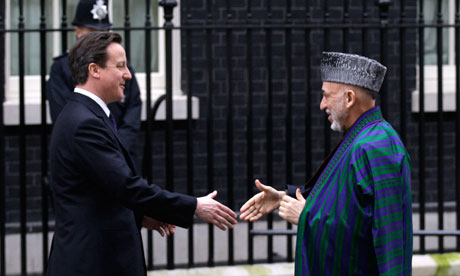Patrick Wintour
Tuesday 1 March 2011 21.23 GMT
- Article history

In trying to find the best tone for foreign policy, David Cameron has been in danger of swivelling from realism to idealism and back again in the space of a fortnight.
The first nine months of his premiership had been marked by a mercantilist position. He was instinctively sceptical of grand schemes to change the world. Foreign policy was for him a few low key G20 summits, a promise to get out of Afghanistan by 2015 with dignity, and a slow rapprochement with his EU partners.
But as his ill-timed trip to the Gulf evolved last week, and as the Middle East revolt grew, Cameron hastily started to fill the near vacuum that had been his foreign policy. His increasingly muscular tone last week served to dispel the initial impression that he was on an arms sales tour, or that his diplomats back home could not order a taxi let alone charter a plane.
But his remarks also reflected a discussion among cabinet members about how to respond to the unexpected scale of events, a discussion mirrored in Washington and other European capitals. Cameron has always rejected what he describes as naive neo-cons, but figures such as George Osborne and Michael Gove have been chipping at him to take a more advanced policy.
By Monday in the Commons, he had started to sound like Tony Blair at his zenith, pronouncing that the kaleidoscope had been shaken across the Middle East. In part, he felt freed to speak out once the initial goal of evacuating British citizens had been achieved.
Yet, by any standards, some of the rhetoric was startling from this former realist: "North Africa and the wider Middle East are now at the epicentre of momentous events. History is sweeping through this region and we therefore need to take this opportunity to look at our entire relationship with this region. Too often in the past we have made a false choice between so-called stability on the one hand and reform and openness on the other."
He went well beyond calling for the panoply of sanctions and expulsions from international institutions that would hurl Libya back into the status of a pariah state. A no-fly zone, possible arming of the rebels and a willingness to look at other British military assets were all raised.
Yesterday he apparently started to shift back towards the realist view as he adopted a more measured tone about arming Libyan rebels. Washington, more focused on the Gulf than north Africa, had signalled its unease about the practicalities. Cameron said the priority instead was to make contact with leaders of free Libyans in the east and to check his growing belief that the rebels were neither tribalists, separatists, nor Islamists, but instead modernists – as animated by freedom as the Qur'an.
But there is also a quiet admission that Libya, only created in the middle of the last century, could be heading for stalemate, or even partition. Just as equally, Gaddafi could realise the game is up and seek sanctuary abroad. No one knows.
In that unstable context, the PM thinks a no-fly zone is a sensible precaution and if properly drafted with the right conditions could yet get security council support.
In the medium term, Cameron will work on persuading the EU to rethink the billions it pours into northern Africa, and whether more could be spent to harness democracy and trade, in the same way as EU money worked earlier to democratise eastern Europe. The deputy prime minister, Nick Clegg, will press this case in Brussels today in a setpiece speech.
All in all the last three weeks have been Cameron's first serious foreign policy test, and he is not the first new prime minister to discover how much fast-moving events test a leader's character, and instinct, as much as ideology. As events unfold in the weeks ahead, there may be many more shifts to come.

No comments:
Post a Comment